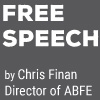The Dangers of Self-Censorship
“Free Speech” is a monthly column by Chris Finan, director of the American Booksellers for Free Expression (ABFE), that shares his personal thoughts and opinions on a broad range of free expression issues; the views expressed do not necessarily reflect those of the American Booksellers Association. Finan welcomes comments and suggestions at [email protected].
Emily Jenkins and Sophie Blackall had every reason to feel proud of their book, A Fine Dessert, when it was published in January 2015.
 A picture book for young children, it charts the passage of centuries by portraying the way that four families prepare and eat the same dessert, a blackberry fool. Jenkins’ story begins in an English cottage in 1710; then moves to a plantation in Charleston, South Carolina, in 1810; a Boston townhouse in 1910; and San Diego bungalow in 2010. Blackall’s illustrations describe the dramatic changes in technology, social customs, and family life.
A picture book for young children, it charts the passage of centuries by portraying the way that four families prepare and eat the same dessert, a blackberry fool. Jenkins’ story begins in an English cottage in 1710; then moves to a plantation in Charleston, South Carolina, in 1810; a Boston townhouse in 1910; and San Diego bungalow in 2010. Blackall’s illustrations describe the dramatic changes in technology, social customs, and family life.
Critics loved A Fine Dessert. In late October, a panel of judges for the New York Times named it one of the 10 best illustrated books of the year. But by then the book was under attack from people who believe that it is not sufficiently critical of slavery in its depiction of life on the Charleston plantation. They were particularly upset by images of the cook’s daughter smiling.
Jenkins apologized. “I have come to understand that my book, while intended to be inclusive and truthful and hopeful, is racially insensitive. I own that and am very sorry,” she said. Jenkins also promised to contribute her royalties to We Need Diverse Books, a group is working to put more books featuring diverse characters into the hands of young readers.
The controversy over how to portray slavery did not end there. Last month, Scholastic halted the sale of a book that it had just published, A Birthday Cake for George Washington, after receiving complaints that the slaves who are the main characters were portrayed as happy. “While we have great respect for the integrity and scholarship of the author, illustrator, and editor, we believe that, without more historical background on the evils of slavery that this book for younger children can provide, the book may give a false impression of the reality of the lives of slaves and should therefore be withdrawn,” the publisher said in a statement.
Should booksellers and other members of the publishing community be concerned when an author has second thoughts about something she has written or a publisher decides to stop distributing one of its books? What are the implications for the freedom to write, publish, and sell books?
This is clearly not a First Amendment case. Scholastic did not break any laws when it withdrew A Birthday Cake for George Washington. The First Amendment says only that government “shall make no law” restricting freedom of speech. It protects the right of publishers — and booksellers — to sell what they want.
Critics of A Fine Dessert and A Birthday Cake for George Washington also have a First Amendment right to condemn the books, even to call for their suppression.
But the actions of private individuals can limit free speech. During periods of great emotion, when important issues are at stake, it is easy to lose sight of the damage that we can do to the free speech rights of others when we fight for our cause.
In this case, the critics, including the white librarians who sponsor the Reading While White blog, see the books as the latest examples of America’s long history of minimizing the harm caused by slavery. They point out that at one time, in movies such as Gone With the Wind, popular culture was saturated with images of “happy” slaves. For them, any smile on the face of a slave is a lie.
The anger is even greater because these two books were written for children. The critics argue that white children will not grasp the cruelty of slavery. In one illustration from A Fine Dessert, the slave mother and daughter hide in a cupboard to lick the last of the dessert from a bowl. “To a four-year-old or an eight-year-old, that just looks like fun,” one librarian told the New York Times. In the same article, a professor at the University of Pennsylvania called the scene “degrading” and said it would have a harmful effect on African-American children. “Imagine reading A Fine Dessert to a classroom in Philadelphia that is 90 percent African-American. How are those kids going to feel?” she asked.
Leslie Mac, who created the hashtag #slaverywithasmile during the protest over A Fine Dessert, welcomed Scholastic’s decision to withdraw A Birthday Cake for George Washington. “It’s great this book will no longer be available,” she wrote on the Ferguson Response Network blog, which was created to support the movement for racial justice following the protests in Ferguson, Missouri. “This book should never have made it to print. Period. This is not self-censorship, this is CORRECTION.”
Ramin Ganeshram, the author of A Birthday Cake for George Washington, has a different view. She defends her book as a historical account of George Washington’s chef, Hercules, a slave who used his great culinary talent to achieve high status in the Washington household. “It is the historical record — not my opinion — that shows that enslaved people who received ‘status’ positions were proud of these positions,” Ganeshram wrote. Artist Vanessa Brantley-Newton depicted Hercules and his daughter as “happy and prideful people” because they had a reason to feel that way, she said.
Sophie Blackall, the illustrator of A Fine Dessert, also responded to the criticism of her book. She says that the children she has read the book to during school visits don’t need to be told that slavery is not pleasurable or fun. While the cook and her daughter are shown enjoying a private moment as they are preparing the dessert, a scene in which they are depicted serving it to the master and his family is grim. It “seems to really strike a chord with young readers,” she wrote. But it is the scene of the mother and daughter hiding in the cupboard that affects them most powerfully. “They are horrified at how unfair it is. There is nothing whimsical about hiding in the cupboard. It conveys a complete lack of freedom.”
The critics of these two books obviously do not accept the explanations of their creators, and they are entitled to their opinions. But when they call for the removal of books they find abhorrent, they violate the spirit of free speech. In a statement protesting Scholastic’s decision to withdraw A Birthday Cake for George Washington, the National Coalition Against Censorship, PEN American Center, and the American Society of Journalists and Authors cited several reasons why withdrawing books that are the subject of controversy is dangerous.
It encourages others to attack books, including titles by minority authors. It also causes authors to think twice before tackling controversial subjects.
Scholastic responded to the criticism by pointing to its record of publishing many controversial titles, including Harry Potter, Hunger Games, and Captain Underpants. It said the situation is different this time because A Birthday Cake for George Washington “did not meet Scholastic’s standards for appropriate presentation of complex social matter in a picture book intended for young children.”
Scholastic certainly has a responsibility to children. But once a book is published, it enters the marketplace of ideas, and the public is the judge of whether it is worthy. If a children’s book is really bad, parents, booksellers, librarians, and teachers will give it a quick death.
Fortunately, A Fine Dessert, which is published by Schwartz & Wade, a Random House imprint, is still on the shelves.
It is too late to judge the merits of A Birthday Cake for George Washington. It has disappeared.


